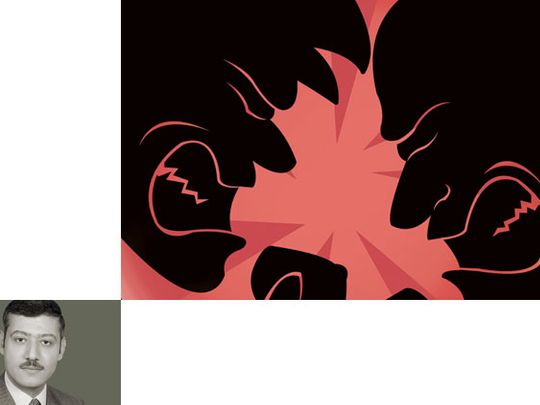
In a story that drew significant attention, particularly among those interested in the evolution of the Syrian crisis, Anthony Shadid of the New York Times quoted western diplomats in Damascus as saying that Syria is descending into a protracted civil war.
While the bleak picture painted by Shadid describes the situation in the country pretty well, the conclusion that Syria is on the verge of a civil war might be a little bit premature. For a civil war to break out in any given community, the parties concerned must first have the will to fight each other; and second they must have, or project, approximately the same amount of power. In other words, any party who wishes to fight a war must believe that he/she has the slightest chance to win it, or at least change the status quo. So far, these two elements are lacking.
Having witnessed what happened in Iraq following the 2003 US invasion and before that the Lebanese civil war (1975-1991), most Syrians do not have the appetite to plunge into communal fighting. Even when some Syrians —frustrated by the regime’s brutal crackdown against restive cities and towns and the lack of action by either the Arab League or the international community — seek to change the nature of the conflict from a peaceful protest movement into armed confrontation, the balance of power, which tilts very much in favour of the regime, does not help bring about this shift. The regime might have lost control, as Shadid argues, over some “regions and its authority ebbing in the suburbs of the capital and parts of major cities like Homs and Hama”. Nevertheless, both the army and the myriad security apparatuses remains absolutely loyal. By contrast, the armed opposition remains poorly equipped, widely dispersed, and lacks any clear chain of command. For these reasons, Syria is not yet in a state of civil war or even near yet. But, as the situation deteriorates and with all of the interested regional and international powers supporting one side or the other, the prospect of civil war does not become improbable. Indeed, slipping into civil war is a matter of time.
In fact, Syrians are paying today the price for decades of bad ruling practices. The ongoing conflict is just one aspect of a failed national process to establish a modern state. It exposes the true nature of the relationship between state and society following five decades of Baath Party and military rule. For the past 50 years, the regime has failed to develop any successful form of national identity. Tribal, sectarian and indeed familial ties remained the optimum loyalties that provide prestige at times of peace and refuge and protection in times of tension.
The Baath Party, which jumped into power in 1963, claimed that it had a clear vision to modernise the state and society and develop national identity. Under this mantle, traditional loyalties were to be replaced by a modern one — presumed to be citizenship. All this turned to be mere rhetoric and pathetic attempt to provide a cover of legitimacy for the ruling class. Traditional loyalties were strengthened and most of the social diseases that accompanied them were in fact preserved and transferred to the state machinery. High positions in the state hierarchy were given to relatives, family and tribe members regardless of skills, qualifications or fitness to fill in certain posts.
The modernisation vision ended up with establishing a regime that owes its durability solely to repression and a narrow sectarian or tribal base of support. Within this context, the state was no longer seen by the majority of the populace as a defender of order and property, but a creator of wealth, power and prestige for the ruling elites. As a consequence of this understanding of the role of the state, national loyalties have failed to exist. Being a good citizen was measured on the basis of one’s love and trust in the ‘great leader’, his party, tribe, and, indeed, his ‘infallible leadership’.
The heavy reliance on coercion in the ongoing crisis exposed the weakness of the regime in the sphere of political socialisation and its failure to create identities beyond the traditional ones. This policy succeeded only in alienating the social groups traditionally supportive of the regime. The fragility of the superficial national identity — claimed to have been established — surfaced from time to time but became clear only with the breakout of the protest movement, as the power of the state declined to the level where it became no longer capable of performing its security functions. Hence, when the regime was challenged by civil disobedience; all the restrained diseases of society floated to the surface. Syria emerged suddenly as a group of tribes, sects and ethnic groups that share little in common. Forced stability disappeared and the absence of a social contract between rulers and the ruled threatens to bring the country close to civil war.
Until the breakout of the protest movement, the Syrian regime claimed to have established the modern state with institutions, recognition, a flag and national anthem. In the light of the ongoing conflict, we may need to produce solid evidence to support these claims.
Dr Marwan Al Kabalan is Dean of the Faculty of International Relations and Diplomacy, Kalamoon University, Damascus, Syria.










